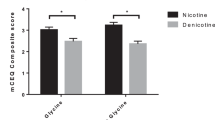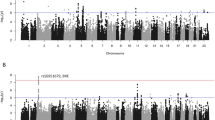Abstract
Smokers (⩾10 cigarettes per day, N=331) of European ancestry taking part in a double-blind placebo-controlled randomized trial of 12 weeks of treatment with bupropion along with counseling for smoking cessation were genotyped for a variable number of tandem repeats polymorphism in exon III of the dopamine D4 receptor gene. Generalized estimating equations predicting point-prevalence abstinence at end of treatment and 2, 6 and 12 months after the end of treatment indicated that bupropion (vs placebo) predicted increased odds of abstinence. The main effect of Genotype was not significant. A Genotype × Treatment interaction (P=0.005) showed that bupropion predicted increased odds of abstinence in long-allele carriers (odds ratios (OR)=1.31, P<0.0001), whereas bupropion was not associated with abstinence among short-allele homozygotes (OR=1.06, P=0.23). The Genotype × Treatment interaction remained when controlling for demographic and clinical covariates (P=0.01) and in analyses predicting continuous abstinence (P's⩽0.054). Bupropion may be more efficacious for smokers who carry the long allele, which is relevant to personalized pharmacogenetic treatment approaches.
This is a preview of subscription content, access via your institution
Access options
Subscribe to this journal
Receive 6 print issues and online access
$259.00 per year
only $43.17 per issue
Buy this article
- Purchase on Springer Link
- Instant access to full article PDF
Prices may be subject to local taxes which are calculated during checkout

Similar content being viewed by others
References
McGeary J . The DRD4 exon 3 VNTR polymorphism and addiction-related phenotypes: a review. Pharmacol Biochem Behav 2009; 93: 222–229.
Wang E, Ding YC, Flodman P, Kidd JR, Kidd KK, Grady DL et al. The genetic architecture of selection at the human dopamine receptor D4 (DRD4) gene locus. Am J Hum Genet 2004; 74: 931–944.
David SP, Munafo MR, Murphy MF, Proctor M, Walton RT, Johnstone EC . Genetic variation in the dopamine D4 receptor (DRD4) gene and smoking cessation: follow-up of a randomised clinical trial of transdermal nicotine patch. Pharmacogenomics J 2008; 8: 122–128.
Munafo MR, Clark TG, Moore LR, Payne E, Walton R, Flint J . Genetic polymorphisms and personality in healthy adults: a systematic review and meta-analysis. Mol Psychiatry 2003; 8: 471–484.
Munafo MR, Johnstone EC . Smoking status moderates the association of the dopamine D4 receptor (DRD4) gene VNTR polymorphism with selective processing of smoking-related cues. Addict Biol 2008; 13: 435–439.
Munafo MR, Yalcin B, Willis-Owen SA, Flint J . Association of the dopamine D4 receptor (DRD4) gene and approach-related personality traits: meta-analysis and new data. Biol Psychiatry 2008; 63: 197–206.
Asghari V, Schoots O, van Kats S, Ohara K, Jovanovic V, Guan HC et al. Dopamine D4 receptor repeat: analysis of different native and mutant forms of the human and rat genes. Mol Pharmacol 1994; 46: 364–373.
Asghari V, Sanyal S, Buchwaldt S, Paterson A, Jovanovic V, Van Tol HH . Modulation of intracellular cyclic AMP levels by different human dopamine D4 receptor variants. J Neurochem 1995; 65: 1157–1165.
Van Tol HH, Wu CM, Guan HC, Ohara K, Bunzow JR, Civelli O et al. Multiple dopamine D4 receptor variants in the human population. Nature 1992; 358: 149–152.
Van Tol HH, Bunzow JR, Guan HC, Sunahara RK, Seeman P, Niznik HB et al. Cloning of the gene for a human dopamine D4 receptor with high affinity for the antipsychotic clozapine. Nature 1991; 350: 610–614.
Rivera A, Cuellar B, Giron FJ, Grandy DK, de la Calle A, Moratalla R . Dopamine D4 receptors are heterogeneously distributed in the striosomes/matrix compartments of the striatum. J Neurochem 2002; 80: 219–229.
Tarazi FI, Campbell A, Yeghiayan SK, Baldessarini RJ . Localization of dopamine receptor subtypes in corpus striatum and nucleus accumbens septi of rat brain: comparison of D1-, D2-, and D4-like receptors. Neuroscience 1998; 83: 169–176.
Mulcrone J, Kerwin RW . The regional pattern of D4 gene expression in human brain. Neurosci Lett 1997; 234: 147–150.
Lahti RA, Roberts RC, Cochrane EV, Primus RJ, Gallager DW, Conley RR et al. Direct determination of dopamine D4 receptors in normal and schizophrenic postmortem brain tissue: a [3H]NGD-94–1 study. Mol Psychiatry 1998; 3: 528–533.
Laucht M, Becker K, Blomeyer D, Schmidt MH . Novelty seeking involved in mediating the association between the dopamine D4 receptor gene exon III polymorphism and heavy drinking in male adolescents: results from a high-risk community sample. Biol Psychiatry 2007; 61: 87–92.
Ray LA, Bryan A, Mackillop J, McGeary J, Hesterberg K, Hutchison KE . The dopamine D receptor (DRD4) gene exon III polymorphism, problematic alcohol use and novelty seeking: direct and mediated genetic effects. Addict Biol 2009; 14: 238–244.
Tidey JW, Monti PM, Rohsenow DJ, Gwaltney CJ, Miranda Jr R, McGeary JE et al. Moderators of naltrexone's effects on drinking, urge, and alcohol effects in non-treatment-seeking heavy drinkers in the natural environment. Alcohol Clin Exp Res 2008; 32: 58–66.
Hutchison KE, Wooden A, Swift RM, Smolen A, McGeary J, Adler L et al. Olanzapine reduces craving for alcohol: a DRD4 VNTR polymorphism by pharmacotherapy interaction. Neuropsychopharmacology 2003; 28: 1882–1888.
Filbey FM, Ray L, Smolen A, Claus ED, Audette A, Hutchison KE . Differential neural response to alcohol priming and alcohol taste cues is associated with DRD4 VNTR and OPRM1 genotypes. Alcohol Clin Exp Res 2008; 32: 1113–1123.
McGeary JE, Monti PM, Rohsenow DJ, Tidey J, Swift R, Miranda Jr R . Genetic moderators of naltrexone's effects on alcohol cue reactivity. Alcohol Clin Exp Res 2006; 30: 1288–1296.
McClernon FJ, Hutchison KE, Rose JE, Kozink RV . DRD4 VNTR polymorphism is associated with transient fMRI-BOLD responses to smoking cues. Psychopharmacology (Berl) 2007; 194: 433–441.
Laucht M, Becker K, Frank J, Schmidt MH, Esser G, Treutlein J et al. Genetic variation in dopamine pathways differentially associated with smoking progression in adolescence. J Am Acad Child Adolesc Psychiatry 2008; 47: 673–681.
Shields PG, Lerman C, Audrain J, Bowman ED, Main D, Boyd NR et al. Dopamine D4 receptors and the risk of cigarette smoking in African-Americans and Caucasians. Cancer Epidemiol Biomarkers Prev 1998; 7: 453–458.
Ascher JA, Cole JO, Colin JN, Feighner JP, Ferris RM, Fibiger HC et al. Bupropion: a review of its mechanism of antidepressant activity. J Clin Psychiatry 1995; 56: 395–401.
Fryer JD, Lukas RJ . Noncompetitive functional inhibition at diverse, human nicotinic acetylcholine receptor subtypes by bupropion, phencyclidine, and ibogaine. J Pharmacol Exp Ther 1999; 288: 88–92.
David SP, Brown RA, Papandonatos GD, Kahler CW, Lloyd-Richardson EE, Munafo MR et al. Pharmacogenetic clinical trial of sustained-release bupropion for smoking cessation. Nicotine Tob Res 2007; 9: 821–833.
David SP, Strong DR, Munafo MR, Brown RA, Lloyd-Richardson EE, Wileyto PE et al. Bupropion efficacy for smoking cessation is influenced by the DRD2 Taq1A polymorphism: analysis of pooled data from two clinical trials. Nicotine Tob Res 2007; 9: 1251–1257.
Conti DV, Lee W, Li D, Liu J, Van Den Berg D, Thomas PD et al. Nicotinic acetylcholine receptor beta2 subunit gene implicated in a systems-based candidate gene study of smoking cessation. Hum Mol Genet 2008; 17: 2834–2848.
Uhl GR, Liu QR, Drgon T, Johnson C, Walther D, Rose JE et al. Molecular genetics of successful smoking cessation: convergent genome-wide association study results. Arch Gen Psychiatry 2008; 65: 683–693.
Brown RA, Niaura R, Lloyd-Richardson EE, Strong DR, Kahler CW, Abrantes AM et al. Bupropion and cognitive-behavioral treatment for depression in smoking cessation. Nicotine Tob Res 2007; 9: 721–730.
American Psychiatric Association. Diagnostic and Statistical Manual of Mental Disorders: DSM-IV. 4th edn. American Psychiatric Association: Washington, DC, 1994.
Lerman C, Caporaso NE, Audrain J, Main D, Bowman ED, Lockshin B et al. Evidence suggesting the role of specific genetic factors in cigarette smoking. Health Psychol 1999; 18: 14–20.
Lichter JB, Barr CL, Kennedy JL, Van Tol HH, Kidd KK, Livak KJ . A hypervariable segment in the human dopamine receptor D4 (DRD4) gene. Hum Mol Genet 1993; 2: 767–773.
Radloff LS . The CES-D scale: a self-report depression scale for research in the general population. Appl Psychol Meas 1977; 1: 385–401.
Heatherton TF, Kozlowski LT, Frecker RC, Fagerström K-O . The Fagerström test for nicotine dependence: a revision of the Fagerström tolerance questionnaire. Br J Addict 1991; 86: 1119–1127.
Hughes J, Stead L, Lancaster T . Antidepressants for smoking cessation. Cochrane Database Syst Rev 2004: CD000031.
Hall SM, Delucchi KL, Velicer WF, Kahler CW, Ranger-Moore J, Hedeker D et al. Statistical analysis of randomized trials in tobacco treatment: longitudinal designs with dichotomous outcome. Nicotine Tob Res 2001; 3: 193–202.
Berrettini WH, Wileyto EP, Epstein L, Restine S, Hawk L, Shields P et al. Catechol-O-methyltransferase (COMT) gene variants predict response to bupropion therapy for tobacco dependence. Biol Psychiatry 2007; 61: 111–118.
Simpson J, Vetuz G, Wilson M, Brookes KJ, Kent L . The DRD4 receptor exon 3 VNTR and 5′ SNP variants and mRNA expression in human post-mortem brain tissue. Am J Med Genet B Neuropsychiatr Genet (in press).
Schoots O, Van Tol HH . The human dopamine D4 receptor repeat sequences modulate expression. Pharmacogenomics J 2003; 3: 343–348.
Hutchison KE, LaChance H, Niaura R, Bryan A, Smolen A . The DRD4 VNTR polymorphism influences reactivity to smoking cues. J Abnorm Psychol 2002; 111: 134–143.
Brody AL, Mandelkern MA, Lee G, Smith E, Sadeghi M, Saxena S et al. Attenuation of cue-induced cigarette craving and anterior cingulate cortex activation in bupropion-treated smokers: a preliminary study. Psychiatry Res 2004; 130: 269–281.
Ferguson SG, Shiffman S . The relevance and treatment of cue-induced cravings in tobacco dependence. J Subst Abuse Treat 2009; 36: 235–243.
Acknowledgements
This research was supported by NIH grants DA025041 (AML), HL32318 and CA84719 (RN), DA08511 (RAB), DA14276 and DA27331 (SPD) and NIDA-IRP.
Author information
Authors and Affiliations
Corresponding author
Ethics declarations
Competing interests
The authors declare no conflict of interest.
PowerPoint slides
Rights and permissions
About this article
Cite this article
Leventhal, A., David, S., Brightman, M. et al. Dopamine D4 receptor gene variation moderates the efficacy of bupropion for smoking cessation. Pharmacogenomics J 12, 86–92 (2012). https://doi.org/10.1038/tpj.2010.64
Received:
Revised:
Accepted:
Published:
Issue Date:
DOI: https://doi.org/10.1038/tpj.2010.64
Keywords
This article is cited by
-
Dopaminergic genetic variation moderates the effect of nicotine on cigarette reward
Psychopharmacology (2016)
-
Gender Considerations in Addiction: Implications for Treatment
Current Treatment Options in Psychiatry (2015)



